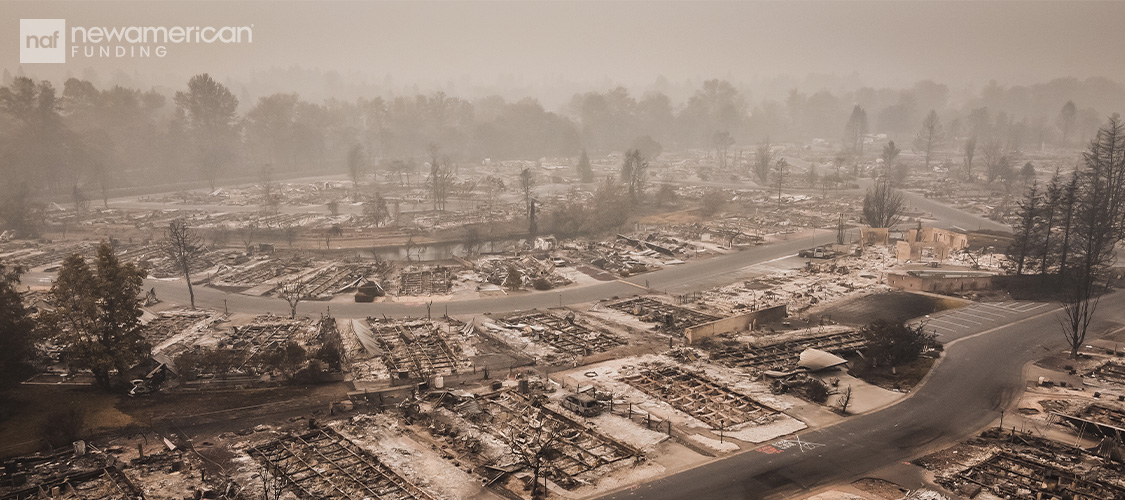Homeowners
If Your Home Is Damaged by a Wildfire, These Programs May Help You Pay Your Bills
June 13, 2025
When a wildfire strikes, the destruction can be overwhelming. But the bills don’t stop. Even if your home is gone or uninhabitable, the monthly mortgage still has to be paid.
That added stress can feel impossible in the wake of so much loss.
Wildfire survivors often find themselves juggling insurance claims, temporary housing, and ongoing mortgage payments, all at once.
Fortunately, there are a range of relief programs that exist to help homeowners manage costs, avoid foreclosure, and begin to recover.
From paused payments to state and federal aid, homeowners have options to lighten the financial load after a disaster.
“Honestly, most homeowners don't know these assistance programs exist until they’re already behind on payments,” said Wesley Kang, the founder of 1099Cafe and a Realtor with Keller Williams Realty in Los Angeles, Calif.
“Homeowners should explore these programs before missing payments as qualification requirements get stricter once you are delinquent,” he added.
1. Homeowner Assistance Fund
One of the first places wildfire survivors can look for help is the Homeowner Assistance Fund (HAF). This is a federal program that offers financial relief to people struggling with housing costs after a disaster.
The HAF was established under the American Rescue Plan Act to help homeowners facing financial hardship. Administered by the U.S. Department of the Treasury, HAF provides funds to states, territories, and tribal entities to assist eligible homeowners with mortgage payments, property taxes, insurance, and other housing-related costs.
The program aims to prevent mortgage delinquencies, defaults, foreclosures, and displacement of homeowners experiencing financial hardship after January 21, 2020.
However, it’s expected to end in September 2026 or when the money has been used.
“It’s become a critical tool for disaster recovery, especially in high-risk states like California,” said Elena Novak, the lead real estate researcher at Property Checker, a Boston-based property data platform. “HAF can cover missed mortgage payments, property taxes, insurance, and even some utility costs.”
2. Mortgage forbearance

If your home is uninhabitable after a wildfire, mortgage forbearance may provide a much-needed break. This may allow you to pause payments while you focus on next steps.
Mortgage forbearance is a temporary pause or reduction in mortgage payments. It’s designed to assist homeowners facing financial hardship due to natural disasters like wildfires.
While it offers immediate relief, it's important to note that the deferred payments are not forgiven and will need to be repaid after the forbearance period ends.
“Homeowners must clearly understand the repayment terms,” said Novak. “Some lenders expect a lump-sum repayment at the end, while others offer payment plans or let you defer the missed amount until the home is refinanced or sold.
“Too many people accept forbearance without knowing what’s waiting for them on the other side,” she said.
3. Loan modifications
For some homeowners whose properties have been damaged or destroyed, loan modifications can offer a lifeline.
A loan modification is a permanent change to the terms of your mortgage that can make monthly payments more affordable. This can be especially helpful if you’re facing financial strain after a wildfire.
Lenders may lower your interest rate, extend the length of your loan, or add missed payments to the end of the loan. While it doesn’t reduce the total amount owed, it can help you avoid foreclosure and stay on track financially.
“Loan modifications change your mortgage terms permanently, while forbearance just delays payments temporarily,” Kang said. “Most homeowners confuse these options.”
He had a client who received a 12-month mortgage forbearance thinking his payments would disappear during that time. However, when the 12-month period ended, he still owed a $24,000 lump sum.
“A modification would have reduced his monthly payment from $3,400 to $2,800 permanently,” Kang said.
4. Tax programs in California

Homeowners in California who have lost their homes to wildfires may qualify for tax relief programs that can ease some of the financial pressure.
These programs offer temporary property tax reductions, extended deadlines for filing taxes, and the ability to transfer your current property tax assessment to a new home.
“Timing is critical,” said Novak. “Claims must be filed within 12 months of the disaster in most counties, and proper documentation is essential.”
The Internal Revenue Service (IRS) also offers tax relief to people and businesses in federally declared disaster areas.
For example, those affected by the California wildfires that started on Jan 7, 2025, have until Oct. 15, 2025, to file their federal tax returns and make payments. This includes extensions for personal, business, and estimated taxes.
Additionally, the IRS allows wildfire victims to claim disaster-related losses on their federal tax returns. Homeowners can choose to deduct the loss in the year the disaster happened or the year before, whichever gives them the bigger tax break.
If you’ve been affected by a wildfire, it may be a good idea to talk to a tax professional or your local tax office. They can help you figure out which relief programs you qualify for and make sure you apply on time.
5. FEMA
The Federal Emergency Management Agency (FEMA) may also provide support to homeowners after a wildfire through grants or temporary housing assistance. The exact support depends on the nature of the disaster and available funding.
While the scope of FEMA’s role can vary, it’s often one of the first federal agencies involved in helping individuals and communities begin recovery efforts.
What homeowners affected by a wildfire need to know
Recovering from a wildfire is never easy, but homeowners don’t have to face it alone.
From mortgage relief and tax breaks to federal programs like HAF, there are resources designed to help ease the financial strain and support long-term recovery.
The key is to act early, ask questions, and explore every available option.
“Keep records from day one,” said Novak. “Homeowners must be proactive and organized to avoid missing deadlines or duplicate benefit disqualifications.”






 Smart Moves Start Here.
Smart Moves Start Here.